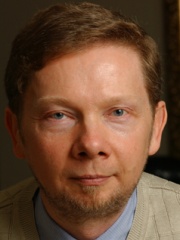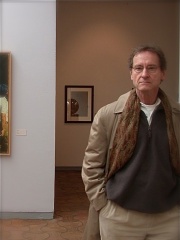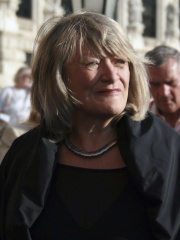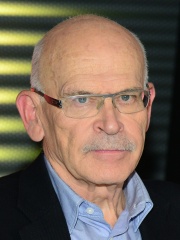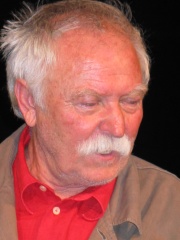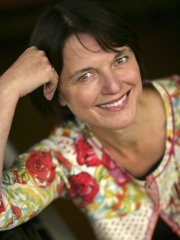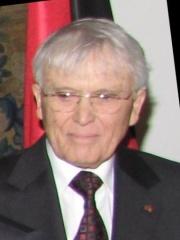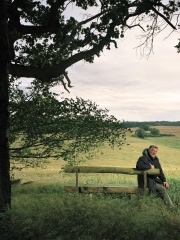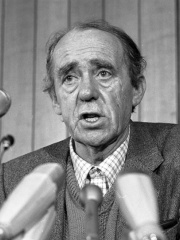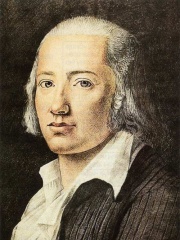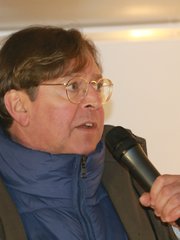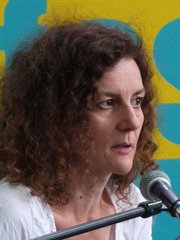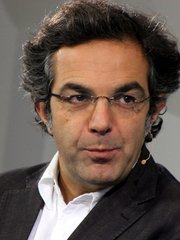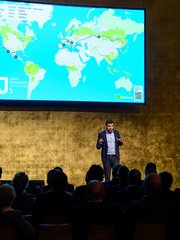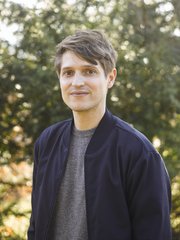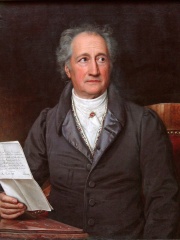
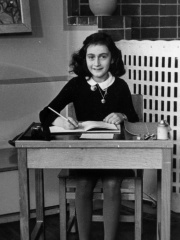

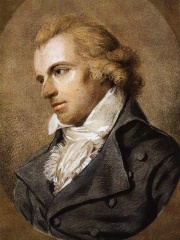

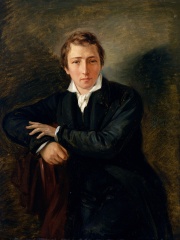
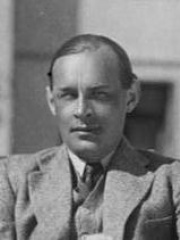
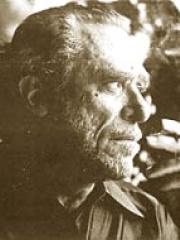
The Most Famous
WRITERS from Germany
This page contains a list of the greatest German Writers. The pantheon dataset contains 7,302 Writers, 389 of which were born in Germany. This makes Germany the birth place of the 4th most number of Writers behind United Kingdom, and France.
Top 10
The following people are considered by Pantheon to be the top 10 most legendary German Writers of all time. This list of famous German Writers is sorted by HPI (Historical Popularity Index), a metric that aggregates information on a biography's online popularity. Visit the rankings page to view the entire list of German Writers.

1. Johann Wolfgang von Goethe (1749 - 1832)
With an HPI of 90.96, Johann Wolfgang von Goethe is the most famous German Writer. His biography has been translated into 188 different languages on wikipedia.
Johann Wolfgang von Goethe (28 August 1749 – 22 March 1832) was a German polymath who is widely regarded as the most influential writer in the German language. His work has had a wide-ranging influence on literary, political, and philosophical thought in the Western world from the late 18th century to the present. A poet, playwright, novelist, scientist, statesman, theatre-director, and critic, Goethe wrote a wide range of works, including plays, poetry and aesthetic criticism, as well as treatises on botany, anatomy, and colour. Goethe took up residence in Weimar in 1775 following the success of his first novel, The Sorrows of Young Werther (1774), and joined a thriving intellectual and cultural environment under the patronage of Duchess Anna Amalia that formed the basis of Weimar Classicism. He was ennobled by Karl August, Duke of Saxe-Weimar, in 1782. Goethe was an early participant in the Sturm und Drang literary movement. During his first ten years in Weimar, Goethe became a member of the Duke's privy council (1776–1785), sat on the war and highway commissions, oversaw the reopening of silver mines in nearby Ilmenau, and implemented a series of administrative reforms at the University of Jena. He also contributed to the planning of Weimar's botanical park and the rebuilding of its Ducal Palace. Goethe's first major scientific work, the Metamorphosis of Plants, was published after he returned from a 1788 tour of Italy. In 1791 he was made managing director of the theatre at Weimar, and in 1794 he began a friendship with the dramatist, historian, and philosopher Friedrich Schiller, whose plays he premiered until Schiller's death in 1805. During this period Goethe published his second novel, Wilhelm Meister's Apprenticeship; the verse epic Hermann and Dorothea, and, in 1808, the first part of his most celebrated drama, Faust. His conversations and various shared undertakings throughout the 1790s with Schiller, Johann Gottlieb Fichte, Johann Gottfried Herder, Alexander von Humboldt, Wilhelm von Humboldt, and August and Friedrich Schlegel have come to be collectively termed Weimar Classicism. The German philosopher Arthur Schopenhauer named Wilhelm Meister's Apprenticeship one of the four greatest novels ever written, while the American philosopher and essayist Ralph Waldo Emerson selected Goethe as one of six "representative men" in his work of the same name (along with Plato, Emanuel Swedenborg, Michel de Montaigne, Napoleon, and William Shakespeare). Goethe's comments and observations form the basis of several biographical works, notably Johann Peter Eckermann's Conversations with Goethe (1836). His poems were set to music by many composers, including Wolfgang Amadeus Mozart, Ludwig van Beethoven, Franz Schubert, Hector Berlioz, Franz Liszt, Richard Wagner, and Gustav Mahler.

2. Anne Frank (1929 - 1945)
With an HPI of 85.31, Anne Frank is the 2nd most famous German Writer. Her biography has been translated into 127 different languages.
Annelies Marie Frank (12 June 1929 – c. February or March 1945) was a German-born Jewish diarist and Holocaust victim. She gained worldwide fame posthumously for keeping a diary documenting her life in hiding during the German occupation of the Netherlands. In the diary, she regularly described her family's everyday life in their hiding place in an Amsterdam attic from 1942 until their arrest in 1944. Frank was born in Frankfurt, Germany, in 1929. In 1934, when she was four and a half, Frank and her family moved to Amsterdam after Adolf Hitler and the Nazi Party gained control of Germany. By May 1940, the family was trapped in Amsterdam due to Germany's occupation. Frank lost her German citizenship in 1941 and became stateless. Despite spending most of her life in the Netherlands and being a de facto Dutch national, she never officially became a Dutch citizen. As persecutions of the Jewish population increased in July 1942, the family went into hiding in rooms concealed behind a bookcase in the building where Frank's father, Otto Frank, worked. The family was arrested two years later by the Gestapo, on 4 August 1944. Following their arrest, the Franks were transported to concentration camps. On 1 November 1944, Anne Frank and her sister, Margot were transferred from Auschwitz to Bergen-Belsen concentration camp, where they died (presumably of typhus) a few months later. The Red Cross estimated that they died in March 1945, with Dutch authorities setting 31 March as the official date. Later research has alternatively suggested that they may have died in February or early March. Otto Frank, the only Holocaust survivor in the family, returned to Amsterdam after World War II to find that Anne's diary had been saved by his secretaries, Miep Gies and Bep Voskuijl. Moved by his daughter's repeated wishes to be an author, Otto Frank published her diary in 1947. It was translated from its original Dutch version and first published in English in 1952 as The Diary of a Young Girl (originally Het Achterhuis in Dutch, lit. 'the back house'; English: The Secret Annex) and has since been translated into over 70 languages. With the publication of The Diary of a Young Girl, Anne became one of the most-discussed Jewish victims of the Holocaust. One of the world's best-known books, it is the basis for several plays and films.

3. Hermann Hesse (1877 - 1962)
With an HPI of 85.13, Hermann Hesse is the 3rd most famous German Writer. His biography has been translated into 114 different languages.
Hermann Karl Hesse (German: [ˈhɛʁman ˈhɛsə] ; 2 July 1877 – 9 August 1962) was a German-Swiss poet and novelist, and winner of the 1946 Nobel Prize in Literature. His interest in Eastern religious, spiritual, and philosophical traditions, combined with his involvement with Jungian analysis, helped to shape his literary work. His best-known novels include Demian, Steppenwolf, Siddhartha, Narcissus and Goldmund, and The Glass Bead Game, each of which explores an individual's search for authenticity, self-knowledge, and spirituality. Hesse was a widely read author in German-speaking countries during his lifetime, but his more enduring international fame did not come until a few years after his death, when, in the mid-1960s, his works became enormously popular with post-World War II generation readers in the United States, Europe, and elsewhere.

4. Friedrich Schiller (1759 - 1805)
With an HPI of 84.57, Friedrich Schiller is the 4th most famous German Writer. His biography has been translated into 114 different languages.
Johann Christoph Friedrich von Schiller (German: [ˈjoːhan ˈkʁɪstɔf ˈfʁiːdʁɪç fɔn ˈʃɪlɐ], short: [ˈfʁiːdʁɪç ˈʃɪlɐ] ; 10 November 1759 – 9 May 1805) was a German playwright, poet, philosopher and historian. Schiller is considered to be one of Germany's most important classical playwrights. He was born in Marbach to a devoutly Protestant family. Initially intended for the priesthood, in 1773 he entered a military academy in Stuttgart and ended up studying medicine. His first play, The Robbers, was written at this time and proved very successful. After a brief stint as a regimental doctor, he left Stuttgart and eventually wound up in Weimar. In 1789, he became professor of History and Philosophy at Jena, where he wrote historical works. During the last seventeen years of his life (1788–1805), Schiller developed a productive, if complicated, friendship with the already famous and influential Johann Wolfgang von Goethe. They frequently discussed issues concerning aesthetics, and Schiller encouraged Goethe to finish works that he had left as sketches. This relationship and these discussions led to a period now referred to as Weimar Classicism. Together they founded the Weimar Theater. They also worked together on Xenien, a collection of short satirical poems in which both Schiller and Goethe challenge opponents of their philosophical vision.
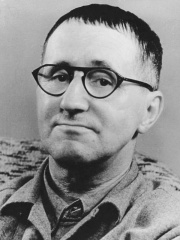
5. Bertolt Brecht (1898 - 1956)
With an HPI of 83.64, Bertolt Brecht is the 5th most famous German Writer. His biography has been translated into 107 different languages.
Eugen Berthold Friedrich Brecht (10 February 1898 – 14 August 1956), known as Bertolt Brecht and Bert Brecht, was a German theatre practitioner, playwright, and poet. Coming of age during the Weimar Republic, he had his first successes as a playwright in Munich and moved to Berlin in 1924, where he wrote The Threepenny Opera with Elisabeth Hauptmann and Kurt Weill and began a life-long collaboration with the composer Hanns Eisler. Immersed in Marxist thought during this period, Brecht wrote didactic Lehrstücke and became a leading theoretician of epic theatre (which he later preferred to call "dialectical theatre") and the Verfremdungseffekt. When the Nazis came to power in Germany in 1933, Brecht fled his home country, initially to Scandinavia. During World War II he moved to Southern California where he established himself as a screenwriter, while also being surveilled by the FBI. In 1947, he was part of the first group of Hollywood film artists to be subpoenaed by the House Un-American Activities Committee for alleged Communist Party affiliations. The day after testifying, he returned to Europe, eventually settling in East Berlin where he co-founded the theatre company Berliner Ensemble with his wife and long-time collaborator, actress Helene Weigel.

6. Thomas Mann (1875 - 1955)
With an HPI of 83.34, Thomas Mann is the 6th most famous German Writer. His biography has been translated into 119 different languages.
Paul Thomas Mann (6 June 1875 – 12 August 1955) was a German novelist, short story writer, social critic, philanthropist, essayist, and the 1929 Nobel Prize in Literature laureate. His highly symbolic and ironic epic novels and novellas are noted for their insight into the psychology of the artist and the intellectual. His analysis and critique of the European and German soul used modernized versions of German and Biblical stories, as well as the ideas of Johann Wolfgang von Goethe, Friedrich Nietzsche, and Arthur Schopenhauer. Mann was a member of the hanseatic Mann family and portrayed his family and class in his first novel, Buddenbrooks (1901). Late major novels include The Magic Mountain (1924), the tetralogy Joseph and His Brothers (1933–1943), and Doctor Faustus (1947); he also wrote short stories and novellas, including Death in Venice (1912). His older brother was the novelist Heinrich Mann, and three of Mann's six children – Erika Mann, Klaus Mann and Golo Mann – also became significant German writers. When Adolf Hitler came to power in 1933, Mann fled to Switzerland. When World War II broke out in 1939, he moved to the United States, then returned to Switzerland in 1952. Mann is one of the best-known exponents of the so-called Exilliteratur, German literature written in exile by those who opposed the Hitler regime.

7. Heinrich Heine (1797 - 1856)
With an HPI of 81.96, Heinrich Heine is the 7th most famous German Writer. His biography has been translated into 97 different languages.
Christian Johann Heinrich Heine (born Harry Heine; 13 December 1797 – 17 February 1856) was a German poet, writer and literary critic. He is best known outside Germany for his early lyric poetry, which was set to music in the form of Lieder (art songs) by composers such as Felix Mendelssohn, Robert Schumann and Franz Schubert. Today, Heine is perhaps best remembered for coining the phrase “Where books burn, so do people.” Heine's later verse and prose are distinguished by their satirical wit and irony. He is considered a member of the Young Germany movement. His radical political views led to many of his works being banned by German authorities—which, however, only added to his fame. He spent the last 25 years of his life as an expatriate in Paris. As an exile in Paris, Heine became a celebrity avatar reflective of the liberal and cosmopolitan values of the mainstream press. To make “an appeal to Heine” was to make an appeal to these values. In particular, Heine is accused by Karl Kraus of being the vector by which the feuilleton spread from France to Germany. In the Third Reich Heine’s name was invoked as an archetype of the extraordinarily influential Jewish opinion columnist and uber-literati. Hitler’s propaganda minister Goebbels wanted to purge the German language of Heinrich Heine’s influence but, according to a 1937 article in the New York Times, found that doing so proved impossible in practice. But even before that, these associations accrued to Heine and his name became a symbol of the values and manners—both good and bad—of the liberal press.

8. Erich Maria Remarque (1898 - 1970)
With an HPI of 81.94, Erich Maria Remarque is the 8th most famous German Writer. His biography has been translated into 93 different languages.
Erich Maria Remarque (; German: [ˈeːʁɪç maˈʁiːa ʁəˈmaʁk] ; born Erich Paul Remark; 22 June 1898 – 25 September 1970) was a German novelist. His landmark novel All Quiet on the Western Front (1928), based on his experience in the Imperial German Army during World War I, was an international bestseller which created a new literary genre of veterans writing about conflict. The book was adapted to film several times. Remarque's anti-war themes led to his condemnation by Nazi propaganda minister Joseph Goebbels as "unpatriotic". He was able to use his literary success and fame to relocate to Switzerland as a refugee, and to the United States, where he became a naturalized citizen.

9. Charles Bukowski (1920 - 1994)
With an HPI of 80.23, Charles Bukowski is the 9th most famous German Writer. His biography has been translated into 77 different languages.
Henry Charles Bukowski ( boo-KOW-skee; born Heinrich Karl Bukowski, German: [ˈhaɪnʁɪç ˈkaʁl buˈkɔfski]; August 16, 1920 – March 9, 1994) was a German-American poet, novelist, and short story writer. His writing was influenced by the social, cultural, and economic ambience of his adopted home city of Los Angeles. Bukowski's work addresses the ordinary lives of poor Americans, the act of writing, alcohol, relationships with women, and the drudgery of work. The FBI kept a file on him as a result of his column Notes of a Dirty Old Man in the LA underground newspaper Open City. Bukowski published extensively in small literary magazines and with small presses beginning in the early 1940s and continuing on through the early 1990s. He wrote thousands of poems, hundreds of short stories and six novels, eventually publishing over sixty books during the course of his career, including his Poems Written Before Jumping Out of an 8 Story Window, published by his friend and fellow poet Charles Potts, and Burning in Water, Drowning in Flame. His poems and stories were republished by John Martin's Black Sparrow Press (now HarperCollins/Ecco Press) as collected volumes of his work. As a reviewer noted, "Bukowski continued to be, thanks to his antics and deliberate clownish performances, the king of the underground ... stressing his loyalty to those small press editors who had first championed his work." Time called Bukowski a "laureate of American lowlife". Adam Kirsch of The New Yorker wrote, "the secret of Bukowski's appeal [is that] he combines the confessional poet's promise of intimacy with the larger-than-life aplomb of a pulp-fiction hero." During his lifetime, Bukowski received little attention from academic critics in the United States, but was better received in Western Europe, particularly the United Kingdom, and especially Germany, where he was born. Since his death in March 1994, Bukowski's life and writings have been the subject of a number of articles and books.
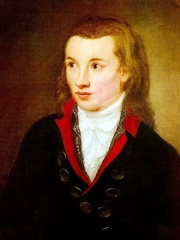
10. Novalis (1772 - 1801)
With an HPI of 79.08, Novalis is the 10th most famous German Writer. His biography has been translated into 71 different languages.
Georg Philipp Friedrich Freiherr von Hardenberg (2 May 1772 – 25 March 1801), pen name Novalis (; German: [noˈvaːlɪs]), was a German aristocrat and polymath, who was a poet, novelist, philosopher and mystic. He is regarded as an influential figure of Jena Romanticism. Novalis was born into a minor aristocratic family in Electoral Saxony. He was the second of eleven children; his early household observed a strict Pietist faith. He studied law at the University of Jena, the University of Leipzig, and the University of Wittenberg. While at Jena, he published his first poem and befriended the playwright and fellow poet Friedrich Schiller. In Leipzig, he then met Friedrich Schlegel, becoming lifelong friends. Novalis completed his law degree in 1794 at the age of 22. He then worked as a legal assistant in Tennstedt immediately after graduating. There, he met Sophie von Kühn. The following year Novalis and Sophie became secretly engaged. Sophie became severely ill soon after the engagement and died just after her 15th birthday. Sophie's early death had a life-long impact on Novalis and his writing. Novalis enrolled at the Freiberg University of Mining and Technology in 1797, where he studied a wide number of disciplines including electricity, medicine, chemistry, physics, mathematics, mineralogy and natural philosophy. He conversed with many of the formative figures of the Early Germanic Romantic period, including Goethe, Friedrich Schelling, Jean Paul and August Schlegel. After finishing his studies, Novalis served as a director of salt mines in Saxony and later in Thuringia. During this time, Novalis wrote major poetic and literary works, including Hymns to the Night. In 1800, he began showing signs of illness, which is thought to have been either tuberculosis or cystic fibrosis, and died on 25 March 1801 at the age of 28. Novalis's early reputation as a romantic poet was primarily based on his literary works, which were published by his friends Friedrich Schlegel and Ludwig Tieck shortly after his death, in 1802. These works include the collection of poems, Hymns to the Night and Spiritual Hymns, and his unfinished novels, Heinrich von Ofterdingen and The Novices at Sais. Schlegel and Tieck published only a small sample of his philosophical and scientific writings. The depth of Novalis's knowledge in fields like philosophy and natural science came to be more broadly appreciated with the more extensive publication of his notebooks in the twentieth century. Novalis was not only well read in his chosen disciplines; he also sought to integrate his knowledge with his art. This goal can be seen in his use of the fragment, a form that he wrote in alongside Friedrich Schlegel, and published in Schlegel's journal Athenaeum. The fragment allowed him to synthesize poetry, philosophy, and science into a single art form that could be used to address a wide variety of topics. Just as Novalis's literary works have established his reputation as a poet, the notebooks and fragments have subsequently established his intellectual role in the formation of Early German Romanticism.
People
Pantheon has 389 people classified as German writers born between 405 and 1987. Of these 389, 57 (14.65%) of them are still alive today. The most famous living German writers include Eckhart Tolle, Patrick Süskind, and Bernhard Schlink. The most famous deceased German writers include Johann Wolfgang von Goethe, Anne Frank, and Hermann Hesse. As of April 2024, 10 new German writers have been added to Pantheon including Greg Iles, Charlotte Link, and Sebastian Fitzek.
Living German Writers
Go to all RankingsEckhart Tolle
1948 - Present
HPI: 76.13
Patrick Süskind
1949 - Present
HPI: 71.79
Bernhard Schlink
1944 - Present
HPI: 69.94
Cornelia Funke
1958 - Present
HPI: 61.44
Udo Lindenberg
1946 - Present
HPI: 61.36
Alice Schwarzer
1942 - Present
HPI: 60.78
Günter Wallraff
1942 - Present
HPI: 60.08
Janosch
1931 - Present
HPI: 59.86
Sylvia Nasar
1947 - Present
HPI: 59.26
Uwe Timm
1940 - Present
HPI: 56.81
Reiner Kunze
1933 - Present
HPI: 56.35
Botho Strauß
1944 - Present
HPI: 55.61
Deceased German Writers
Go to all RankingsJohann Wolfgang von Goethe
1749 - 1832
HPI: 90.96
Anne Frank
1929 - 1945
HPI: 85.31
Hermann Hesse
1877 - 1962
HPI: 85.13
Friedrich Schiller
1759 - 1805
HPI: 84.57
Bertolt Brecht
1898 - 1956
HPI: 83.64
Thomas Mann
1875 - 1955
HPI: 83.34
Heinrich Heine
1797 - 1856
HPI: 81.96
Erich Maria Remarque
1898 - 1970
HPI: 81.94
Charles Bukowski
1920 - 1994
HPI: 80.23
Novalis
1772 - 1801
HPI: 79.08
Heinrich Böll
1917 - 1985
HPI: 79.08
Friedrich Hölderlin
1770 - 1843
HPI: 78.31
Newly Added German Writers (2025)
Go to all RankingsGreg Iles
1960 - 2025
HPI: 52.55
Charlotte Link
1963 - Present
HPI: 51.33
Sebastian Fitzek
1971 - Present
HPI: 50.34
Udo Ulfkotte
1960 - 2017
HPI: 49.28
Dea Loher
1964 - Present
HPI: 45.30
Helena Janeczek
HPI: 44.97
Navid Kermani
1967 - Present
HPI: 44.95
Jonas Deichmann
1987 - Present
HPI: 40.26
Benedict Wells
1984 - Present
HPI: 39.78
Kristof Magnusson
1976 - Present
HPI: 36.55
Overlapping Lives
Which Writers were alive at the same time? This visualization shows the lifespans of the 25 most globally memorable Writers since 1700.

